Matt Rees's Blog - Posts Tagged "thriller"
From Romance to Corpses: Tess Gerritsen’s Writing Life
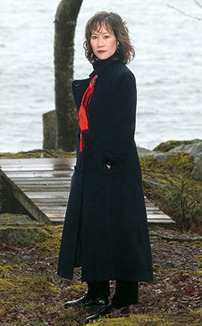 Tess Gerritsen started with romance, but soon realized that dead bodies were where it’s at. At least, dead bodies handled deftly by the two most compelling female series characters in thriller fiction, Detective Jane Rizzoli and Dr. Maura Isles. Her first books were romance novels, but after writing eight of them she switched to medical thrillers. The 25 million books she has sold prove that this was one plot twist she very much got right. The first of many, in fact. Tess is an absolute master at a particular kind of twist which does more than simply surprise the reader. Her plotting and pacing genius is such that each new element seems to set the actual book racing as fast as the reader’s pulse. I saw her at work in this way at a recent book festival in Dubai. At a social barbeque for the writers attending, we were chatting about an anecdotal incident from another writer’s student days. Tess took what had been a moderately disturbing moment for the writer and instantly rattled off enough nimble plot twists to structure the first quarter of a fast-paced thriller—so that those of us chatting around the roasted chickens were gasping and wishing for her to tell us how the story would end. That’s part of Tess Gerritsen’s tremendous gift. But once she has that idea, how does she proceed? Here’s what she has to say about her Writing Life:
Tess Gerritsen started with romance, but soon realized that dead bodies were where it’s at. At least, dead bodies handled deftly by the two most compelling female series characters in thriller fiction, Detective Jane Rizzoli and Dr. Maura Isles. Her first books were romance novels, but after writing eight of them she switched to medical thrillers. The 25 million books she has sold prove that this was one plot twist she very much got right. The first of many, in fact. Tess is an absolute master at a particular kind of twist which does more than simply surprise the reader. Her plotting and pacing genius is such that each new element seems to set the actual book racing as fast as the reader’s pulse. I saw her at work in this way at a recent book festival in Dubai. At a social barbeque for the writers attending, we were chatting about an anecdotal incident from another writer’s student days. Tess took what had been a moderately disturbing moment for the writer and instantly rattled off enough nimble plot twists to structure the first quarter of a fast-paced thriller—so that those of us chatting around the roasted chickens were gasping and wishing for her to tell us how the story would end. That’s part of Tess Gerritsen’s tremendous gift. But once she has that idea, how does she proceed? Here’s what she has to say about her Writing Life:You had a career in medicine before you published. But for how long
before you became a professional writer were you interested in writing?
I knew I was a writer at age seven. I wanted to apply to journalism school as a teen, but my father -- a very practical Chinese-American parent -- warned me that writing was no way to make a secure living. As an obedient Chinese daughter, I followed his advice and went to medical school instead. But a few years into being a doctor those old writing impulses reasserted themselves and while I was home on maternity leave with my sons, I wrote my first novels. A few years later, I realized that I really could make a living as a writer – and I've been one ever since.
How long did it take you to get published?
I wrote two practice manuscripts before my third was accepted. That was CALL AFTER MIDNIGHT, a romantic thriller that was published by Harlequin/Mira books. I wrote romances, and then wrote a thriller HARVEST, which was my first really big bestseller. I've stuck with thrillers since then.
Would you recommend any books on writing?
TELLING LIES FOR FUN AND PROFIT by Lawrence Block is my favorite advice book about the craft of writing. It's funny, it's snappy, and it's spot-on.
What’s a typical writing day?
Breakfast, coffee, exercise, and then four first-draft pages. Only when I've written those four pages do I call it a day. It usually takes me all day to produce those four pages.
Read the rest of this post on my blog The Man of Twists and Turns.
Published on April 17, 2011 05:40
•
Tags:
american-crime-fiction, crime-fiction, medical-thriller, tess-gerritsen, thriller, writers, writers-interviews, writing-life
Writing Tip #93: Walking and plotting
 Readers like to ask writers “Where do you get your ideas?” It’s such a common question at book readings that I’ve noticed writers (on blogs) making fun of people who ask it. Yet it’s rather silly to ridicule someone for asking a question most writers can’t answer themselves.
Readers like to ask writers “Where do you get your ideas?” It’s such a common question at book readings that I’ve noticed writers (on blogs) making fun of people who ask it. Yet it’s rather silly to ridicule someone for asking a question most writers can’t answer themselves.So here’s my answer: I get my best ideas by walking.
Just lately I’ve been plotting my next book, which is going to be a thriller set in Iraq and New York. I’ve done a good deal of thinking about it in my office, standing in front of my computer or slouched in my bean bag. But when I’m in front of the computer, I find myself thinking about what to write for this blog. And on the bean bag I get distracted by the little white polystyrene balls which seem endlessly to leak out of it onto my Iranian kilim.
The best ideas for this new novel have come to me as I walk home from the gym. It’s not because I’m walking through the prettiest part of town. I walk along a busy dual-carriageway linking two other noisy, busy roads. I sweat like a pig, too – I remind you that I live in Jerusalem, which is a mountainous desert town.
But all the way I’m chattering into my digital voice recorder, setting down my ideas. The reason is simple: relaxation and lack of distraction. I have nothing else to do but walk. Nowhere to go but where I’m going. Nothing to see but fast-moving traffic and a deserted sand lot. My mind is free to be creative, because it’s unhindered by anything else. (I’m quite capable of walking and doing something else at the same time, fortunately.)
In my meditation classes, I’ve sometimes practiced a walking meditation. If you pay attention to each step, the way your foot falls, you’ll soon find your mind entirely clear of any distraction. The same thing is happening on my way home from the gym.
Read the rest of this post on my blog The Man of Twists and Turns.
Published on June 30, 2011 09:18
•
Tags:
ideas, iraq, meditation, new-york, plots, thriller, walking-meditation, writing, writing-tips
My chat with Tom Clancy
Master of techno twists and turns dead. Or is he?
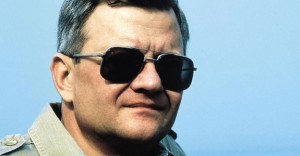
It's hard to imagine that Tom Clancy, who died this week, was only 66. He had been at the top of the thriller game for so long. The Hunt for Red October was published almost 30 years ago.
The time I met Clancy was longer ago than I'd care to acknowledge, too. I was a reporter for Forbes magazine. It was 1992, and as is the wont of that magazine of Mammon I was preparing an article about the biggest earners in various fields. That sent me off to chat about Wall Street with Christie Turlington (who giggled a lot) and Michael DeBakey, the heart transplant pioneer (who didn't giggle at all.)
I also found myself face to face with Clancy, sucking in some second-hand smoke and staring at his smoky-dark Aviators.
He was terrific.
"When my friends tell me they've made a killing on the Street, they're not talking about Wall Street," he said. "They really mean it."
Plenty of people who haven't read a Clancy novel understood what others meant when they said the 9/11 plot was "like something out of a Tom Clancy novel." Now that the obits sum up his achievements, I detect the usual undertone of "well, he was ONLY a thriller writer." I'm here to tell you that he was much more than that.
Clancy did seem to have amazing information from within the "military-industrial complex." But the overriding sense I had of him was that he was playing a role, much in the way that James Ellroy plays a misanthropic hardboiled gumshoe (when really he just likes to sit in the dark and listen to Beethoven symphonies.)
Unlike Ellroy (by my estimation), Clancy enjoyed his act. He had tapped into the military hardware nerd hidden deep inside himself and turned that guy into a money-making (thrill-making) machine, all with a typewriter (it was a long time ago, as I said) and a pair of polarized lenses. The Clancy-industrial complex includes video games and "co-written" novels that, according to Forbes, earn him upwards of $35 million a year.
So I'm sorry to lose him. Because anyone who has fun writing and talking about writing is a big success, no matter how much money they do or don't make.

It's hard to imagine that Tom Clancy, who died this week, was only 66. He had been at the top of the thriller game for so long. The Hunt for Red October was published almost 30 years ago.
The time I met Clancy was longer ago than I'd care to acknowledge, too. I was a reporter for Forbes magazine. It was 1992, and as is the wont of that magazine of Mammon I was preparing an article about the biggest earners in various fields. That sent me off to chat about Wall Street with Christie Turlington (who giggled a lot) and Michael DeBakey, the heart transplant pioneer (who didn't giggle at all.)
I also found myself face to face with Clancy, sucking in some second-hand smoke and staring at his smoky-dark Aviators.
He was terrific.
"When my friends tell me they've made a killing on the Street, they're not talking about Wall Street," he said. "They really mean it."
Plenty of people who haven't read a Clancy novel understood what others meant when they said the 9/11 plot was "like something out of a Tom Clancy novel." Now that the obits sum up his achievements, I detect the usual undertone of "well, he was ONLY a thriller writer." I'm here to tell you that he was much more than that.
Clancy did seem to have amazing information from within the "military-industrial complex." But the overriding sense I had of him was that he was playing a role, much in the way that James Ellroy plays a misanthropic hardboiled gumshoe (when really he just likes to sit in the dark and listen to Beethoven symphonies.)
Unlike Ellroy (by my estimation), Clancy enjoyed his act. He had tapped into the military hardware nerd hidden deep inside himself and turned that guy into a money-making (thrill-making) machine, all with a typewriter (it was a long time ago, as I said) and a pair of polarized lenses. The Clancy-industrial complex includes video games and "co-written" novels that, according to Forbes, earn him upwards of $35 million a year.
So I'm sorry to lose him. Because anyone who has fun writing and talking about writing is a big success, no matter how much money they do or don't make.
Published on October 03, 2013 04:04
•
Tags:
crime-fiction, techno-thriller, thriller, tom-clancy, tom-clancy-obituary
New Israeli thriller focuses on life beyond the conflict
The first English translation of Israel's top crime novelist

Liad Shoham has been the most successful Israeli crime writer for some years now. Lineup, the first of his books to appear in English, has just been published in the US. Liad guest posts here about how he came to write his novels.
Several years ago, I was studying for my master’s degree in law at the London School of Economics. A few days after the beginning of the term, we had a departmental cocktail party. The school dean went around the room from one student to the next asking each where he or she came from and what they intended to study. When I said I was Israeli, and before I had had a chance to tell the dean what fields interested me most, he gleefully announced that the school had an “excellent course on the laws of war”.
Later I had the opportunity to meet my London classmates and to tell them that I had started writing legal thrillers. I was expecting to elicit the reaction I got from my Israeli friends: what does a geek like you know about writing thrillers? But my non-Israeli friends (despite, I suspect, sharing the sentiment) were more surprised by the fact that this genre even exists in Israel.
Well, it does. It is true that when Israel was founded and fighting for its survival this type of fiction was considered too frivolous for words and accordingly there were few thriller writers. Even the ones who wrote thrillers tended to publish under pen names. But Israel is changing and maturing and our literature reflects this. As David Ben Gurion, Israel’s first prime minister, said: “We’ll be a country like all other countries only once we have Israeli thieves and Israeli prostitutes.” And if I may expand on that -- Israeli thrillers.
One can certainly learn a great deal about Israel by listening to the international news and by reading novels dealing with the Arab Israeli conflict. But this will probably create a skewed view of the country, as anyone who has sampled Tel Aviv’s nightlife can attest. One might learn a great deal by exploring Israel’s daily life and crime fiction is a great place to start as it deals with the discovery of the truth, portrays how the police, the judicial system, the media and criminals operate and especially how do they operate under pressure.
Lineup is my fifth thriller. The story occurs in Israel. However, the plot could have taken place in almost any other Western democracy. Yet, I feel that Lineup is also a very Israeli story.
First and foremost, the characters demonstrate a tendency toward improvisation and a rather lax attitude towards process and decorum. Lineup is told by several people. Each narrator provides his or her own worldview. Everyone tries to do what they feel is right, even if what is “right” doesn’t follow the rules. They tend to go light on long-term planning, and rather improvise their way from one problem to the next. In a young country that needs to cope with a dynamically changing reality, improvisation is an integral part of life. I think that the book was also influenced to a great extent by the fact that the storyline occurs in a small place, in terms of geographical size and population. There’s nowhere to run away to, everyone potentially knows everyone else, and there will be constant meddling in your business. This same overcrowding creates involvement and a lot of family influence. Oh, yeah, it’s also very hot here in the summer.
A decade has passed since my days as a student in London and I don’t know what the dean is now saying to Israeli students. I hope that we, the Israelis as well as the Arabs, are able to create a narrative that is not only about the conflict and the laws of war. Lineup is my small contribution to this.

Liad Shoham has been the most successful Israeli crime writer for some years now. Lineup, the first of his books to appear in English, has just been published in the US. Liad guest posts here about how he came to write his novels.
Several years ago, I was studying for my master’s degree in law at the London School of Economics. A few days after the beginning of the term, we had a departmental cocktail party. The school dean went around the room from one student to the next asking each where he or she came from and what they intended to study. When I said I was Israeli, and before I had had a chance to tell the dean what fields interested me most, he gleefully announced that the school had an “excellent course on the laws of war”.
Later I had the opportunity to meet my London classmates and to tell them that I had started writing legal thrillers. I was expecting to elicit the reaction I got from my Israeli friends: what does a geek like you know about writing thrillers? But my non-Israeli friends (despite, I suspect, sharing the sentiment) were more surprised by the fact that this genre even exists in Israel.
Well, it does. It is true that when Israel was founded and fighting for its survival this type of fiction was considered too frivolous for words and accordingly there were few thriller writers. Even the ones who wrote thrillers tended to publish under pen names. But Israel is changing and maturing and our literature reflects this. As David Ben Gurion, Israel’s first prime minister, said: “We’ll be a country like all other countries only once we have Israeli thieves and Israeli prostitutes.” And if I may expand on that -- Israeli thrillers.
One can certainly learn a great deal about Israel by listening to the international news and by reading novels dealing with the Arab Israeli conflict. But this will probably create a skewed view of the country, as anyone who has sampled Tel Aviv’s nightlife can attest. One might learn a great deal by exploring Israel’s daily life and crime fiction is a great place to start as it deals with the discovery of the truth, portrays how the police, the judicial system, the media and criminals operate and especially how do they operate under pressure.
Lineup is my fifth thriller. The story occurs in Israel. However, the plot could have taken place in almost any other Western democracy. Yet, I feel that Lineup is also a very Israeli story.
First and foremost, the characters demonstrate a tendency toward improvisation and a rather lax attitude towards process and decorum. Lineup is told by several people. Each narrator provides his or her own worldview. Everyone tries to do what they feel is right, even if what is “right” doesn’t follow the rules. They tend to go light on long-term planning, and rather improvise their way from one problem to the next. In a young country that needs to cope with a dynamically changing reality, improvisation is an integral part of life. I think that the book was also influenced to a great extent by the fact that the storyline occurs in a small place, in terms of geographical size and population. There’s nowhere to run away to, everyone potentially knows everyone else, and there will be constant meddling in your business. This same overcrowding creates involvement and a lot of family influence. Oh, yeah, it’s also very hot here in the summer.
A decade has passed since my days as a student in London and I don’t know what the dean is now saying to Israeli students. I hope that we, the Israelis as well as the Arabs, are able to create a narrative that is not only about the conflict and the laws of war. Lineup is my small contribution to this.
Published on October 09, 2013 01:46
•
Tags:
biography, diplomacy, israel, jewish-history, liad-shoham, middle-east, netanyahu, politics, thriller
Great new thriller DEAD EVERY DAY Episode 1 out today
A great new thriller out today in episode form:
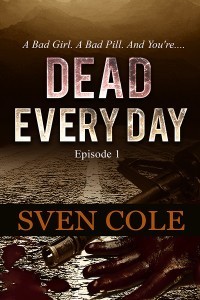
The shocking first episode of DEAD EVERY DAY: An Ellis Callan Thriller is out now. Download the US edition or get the UK edition
or get the UK edition .
.
Military historian Ellis Callan heads out on patrol in Baghdad to gather material for his oral history of the war in Iraq. The patrol goes badly wrong. Callan is left with guilt for the comrades and civilians he believes he should've saved. He turns to his sister, a psychiatrist. He takes an experimental pill for post-traumatic stress disorder. Then things get weird...
The second and third episodes of the novel will be out weekly.

The shocking first episode of DEAD EVERY DAY: An Ellis Callan Thriller is out now. Download the US edition
Military historian Ellis Callan heads out on patrol in Baghdad to gather material for his oral history of the war in Iraq. The patrol goes badly wrong. Callan is left with guilt for the comrades and civilians he believes he should've saved. He turns to his sister, a psychiatrist. He takes an experimental pill for post-traumatic stress disorder. Then things get weird...
The second and third episodes of the novel will be out weekly.
Published on January 29, 2014 01:24
•
Tags:
baghdad, iraq, military-thriller, new-release, new-york, psychological-thriller, ptsd, suspense, thriller
New Mideast thriller parallels mad reality
Dan Williams blows the lid off the Middle East with his new thriller STRIP MINE
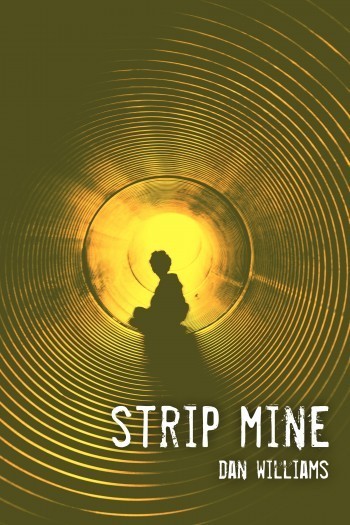
Dan Williams is a leading foreign correspondent covering the Middle East. He also has a profound background in fiction writing which he lets rip in his new novel Strip Mine: A Jodie Moore Thriller. What's it about? Check this out for a fine example of what in the business is called a logline:
"A Mossad spy. A Hamas detective. An unthinkable alliance, to thwart an unthinkable crime."
Try telling me you don't want to read that.
Here Dan writes about how he got the idea for his thriller.
In May 2002 I was among foreign journalists staking out Bethlehem's Church of the Nativity, where a band of Palestinian gunmen were holed up, surrounded by the Israeli military. The siege became almost routine.
Then, something extraordinary happened: A dozen foreign activists dashed across the plaza and right into the church, eluding Israeli troops who had - presumably - sealed off the area long before.
It was one of those double-take moments with which Middle East geopolitics bristles. One of my colleagues turned to me and quipped about the activists: "I bet they're Israeli spies or something, sent in to finish off the resistance."
They weren't, of course, but the idea stayed with me as a kind of parallel perception of what might have happened. And it evolved into a pivotal scene for my novel Strip Mine: A Jodie Moore Thriller .
Seasoned journalists, returning from the field, speak of "emptying their notebooks" onto the page for fresh, first-hand reportage. Perhaps the fiction-writing version of that involves emptying out your imagination - all those shelved conspiracy theories, fancied snippets of conversation, and backstories applied to actual people who, with just a little extra color and contrivance, make great characters.
I worried, for a while, about whether writing the novel necessitated a strict right brain/left brain separation from my journalism - say, by fictionalizing the names and locations of security agencies in Israel or Gaza. I eventually relaxed, realizing that real events in the region were such an unpredictable jumble that they might end up hewing, by sheer happenstance, to my plot.
That happened, arguably, in regards to the theme of Hamas and Israel finding themselves equally challenged by radical Salafist Muslims, or of the Jewish state feeling lethally penned in by sectarian bedlam on its borders.
But things may eventually improve, in which case I hope the book will serve as a snapshot for the Israeli-Palestinian mood at a tumultuous time.
Related articles across the web
 Gaza left out of Mideast peace talks
Gaza left out of Mideast peace talks
 Kerry, Abbas to Discuss Mideast Peace in Paris
Kerry, Abbas to Discuss Mideast Peace in Paris

Dan Williams is a leading foreign correspondent covering the Middle East. He also has a profound background in fiction writing which he lets rip in his new novel Strip Mine: A Jodie Moore Thriller. What's it about? Check this out for a fine example of what in the business is called a logline:
"A Mossad spy. A Hamas detective. An unthinkable alliance, to thwart an unthinkable crime."
Try telling me you don't want to read that.
Here Dan writes about how he got the idea for his thriller.
In May 2002 I was among foreign journalists staking out Bethlehem's Church of the Nativity, where a band of Palestinian gunmen were holed up, surrounded by the Israeli military. The siege became almost routine.
Then, something extraordinary happened: A dozen foreign activists dashed across the plaza and right into the church, eluding Israeli troops who had - presumably - sealed off the area long before.
It was one of those double-take moments with which Middle East geopolitics bristles. One of my colleagues turned to me and quipped about the activists: "I bet they're Israeli spies or something, sent in to finish off the resistance."
They weren't, of course, but the idea stayed with me as a kind of parallel perception of what might have happened. And it evolved into a pivotal scene for my novel Strip Mine: A Jodie Moore Thriller .
Seasoned journalists, returning from the field, speak of "emptying their notebooks" onto the page for fresh, first-hand reportage. Perhaps the fiction-writing version of that involves emptying out your imagination - all those shelved conspiracy theories, fancied snippets of conversation, and backstories applied to actual people who, with just a little extra color and contrivance, make great characters.
I worried, for a while, about whether writing the novel necessitated a strict right brain/left brain separation from my journalism - say, by fictionalizing the names and locations of security agencies in Israel or Gaza. I eventually relaxed, realizing that real events in the region were such an unpredictable jumble that they might end up hewing, by sheer happenstance, to my plot.
That happened, arguably, in regards to the theme of Hamas and Israel finding themselves equally challenged by radical Salafist Muslims, or of the Jewish state feeling lethally penned in by sectarian bedlam on its borders.
But things may eventually improve, in which case I hope the book will serve as a snapshot for the Israeli-Palestinian mood at a tumultuous time.
Related articles across the web
 Gaza left out of Mideast peace talks
Gaza left out of Mideast peace talks  Kerry, Abbas to Discuss Mideast Peace in Paris
Kerry, Abbas to Discuss Mideast Peace in Paris
Published on February 26, 2014 03:02
•
Tags:
crime-fiction, dan-williams, hamas, israel, middle-east, mossad, palestine, thriller
Dead Every Day: Pt 6 of the exclusive podcast thriller
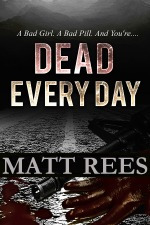 The sixth installment of a FREE crime thriller in serial form. Matt Rees reads his psychological thriller DEAD EVERY DAY. Set in Iraq and New York, it's the story of Ellis Callan, a former Marine and history professor, stricken by post-traumatic stress disorder and caught up in a mystery surrounding the murders of three women around him. In this installment Callan discovers that his girlfriend has a shocking secret in her past. A bad girl, a bad pill, and you're Dead Every Day. Get Matt's FREE ebook too.
The sixth installment of a FREE crime thriller in serial form. Matt Rees reads his psychological thriller DEAD EVERY DAY. Set in Iraq and New York, it's the story of Ellis Callan, a former Marine and history professor, stricken by post-traumatic stress disorder and caught up in a mystery surrounding the murders of three women around him. In this installment Callan discovers that his girlfriend has a shocking secret in her past. A bad girl, a bad pill, and you're Dead Every Day. Get Matt's FREE ebook too.Get the Podcast: Download the MP3
Subscribe on iTunes
Listen on Stitcher.
Wherever you listen, don't forget to rate the podcast and leave a comment!

Get a FREE ebook of my crime stories.
Published on March 19, 2014 00:46
•
Tags:
crime-fiction, podcast-novel, reading, thriller
Dead Every Day: Pt 7 of the exclusive podcast thriller
 The seventh installment of the FREE crime thriller in serial form. Award-winning crime novelist Matt Rees reads his psychological thriller DEAD EVERY DAY. Set in Iraq and New York, it's the story of Ellis Callan, a former Marine and history professor, stricken by post-traumatic stress disorder and caught up in a mystery surrounding the murders of three women around him. In this installment Callan returns from a trip to be confronted by homicide detectives. A bad girl, a bad pill, and you're Dead Every Day. Get Matt's FREE ebook too.
The seventh installment of the FREE crime thriller in serial form. Award-winning crime novelist Matt Rees reads his psychological thriller DEAD EVERY DAY. Set in Iraq and New York, it's the story of Ellis Callan, a former Marine and history professor, stricken by post-traumatic stress disorder and caught up in a mystery surrounding the murders of three women around him. In this installment Callan returns from a trip to be confronted by homicide detectives. A bad girl, a bad pill, and you're Dead Every Day. Get Matt's FREE ebook too.Get the Podcast: Download the MP3
Subscribe on iTunes
Listen on Stitcher.
Wherever you listen, don't forget to rate the podcast and leave a comment!

Get a FREE ebook of my crime stories.
Published on March 23, 2014 04:48
•
Tags:
crime-fiction, podcast-novel, reading, thriller
If you read only one Lee Child thriller, read '61 Hours'
Child’s evocation of the Dakota winter shows how well he writes
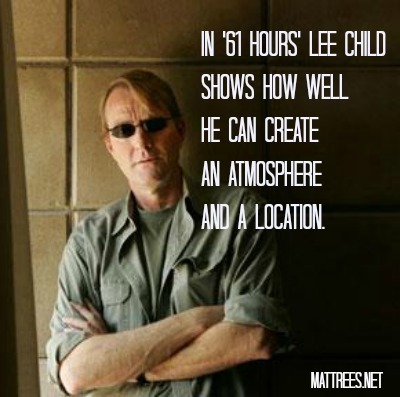
Lee Child is justly famous for creating a compelling main character in the loner Jack Reacher and for building plots that turn the pages for you -- and fast.
In 61 Hours Lee Child shows how well he can create an atmosphere and a location. The frozen tundra of Dakota is the setting and it’s almost a character in the plot. After I read 61 Hours I went back to some other Child novels and saw that he had written just as strongly about the often lonely locales of Nebraska and Indiana in other Reacher books. But it hadn’t struck me quite as forcefully as the chilly reaches of Dakota. Still it was there and it demonstrates the quality of Child’s work.
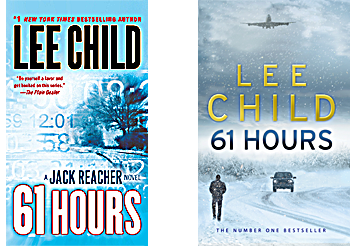 It also highlights the deftness of Child's writing in general. Reviewers write about Child as the ultimate page-turner. It's a guilty pleasure, writes one chap in The Guardian, that comes out in conversation only when you realize that others are addicted.
It also highlights the deftness of Child's writing in general. Reviewers write about Child as the ultimate page-turner. It's a guilty pleasure, writes one chap in The Guardian, that comes out in conversation only when you realize that others are addicted.
I don't see it that way, and 61 Hours demonstrates why. Page-turner, I think, implies that the writing doesn't get in the way. It doesn't make you pause to think: "What does the writer mean by this phrase?" Yet without bogging down in too much description, Child creates a visceral sense of the Dakota winter.
In fact the sense of place in Child's books is at least as strong as the sense of Reacher as a character. Often the titles of Child's novels are a bit forgettable (though '61 Hours' is memorable because it relates to something specific within the plot). So the way I remember them is, "Oh, that's the one that takes place in Boston and in a remote spot in Maine." You see, the anchor is the place.
Perhaps that's because Child is a Brit living in America. Maybe it gives him a heightened awareness of place.
All the Jack Reacher books are wonderful. Which is your favorite? Let me know.

Get a FREE ebook of my crime stories.
Read more If you read only one... For the indispensable book by each big thriller writer.

Lee Child is justly famous for creating a compelling main character in the loner Jack Reacher and for building plots that turn the pages for you -- and fast.
In 61 Hours Lee Child shows how well he can create an atmosphere and a location. The frozen tundra of Dakota is the setting and it’s almost a character in the plot. After I read 61 Hours I went back to some other Child novels and saw that he had written just as strongly about the often lonely locales of Nebraska and Indiana in other Reacher books. But it hadn’t struck me quite as forcefully as the chilly reaches of Dakota. Still it was there and it demonstrates the quality of Child’s work.
 It also highlights the deftness of Child's writing in general. Reviewers write about Child as the ultimate page-turner. It's a guilty pleasure, writes one chap in The Guardian, that comes out in conversation only when you realize that others are addicted.
It also highlights the deftness of Child's writing in general. Reviewers write about Child as the ultimate page-turner. It's a guilty pleasure, writes one chap in The Guardian, that comes out in conversation only when you realize that others are addicted.I don't see it that way, and 61 Hours demonstrates why. Page-turner, I think, implies that the writing doesn't get in the way. It doesn't make you pause to think: "What does the writer mean by this phrase?" Yet without bogging down in too much description, Child creates a visceral sense of the Dakota winter.
In fact the sense of place in Child's books is at least as strong as the sense of Reacher as a character. Often the titles of Child's novels are a bit forgettable (though '61 Hours' is memorable because it relates to something specific within the plot). So the way I remember them is, "Oh, that's the one that takes place in Boston and in a remote spot in Maine." You see, the anchor is the place.
Perhaps that's because Child is a Brit living in America. Maybe it gives him a heightened awareness of place.
All the Jack Reacher books are wonderful. Which is your favorite? Let me know.

Get a FREE ebook of my crime stories.
Read more If you read only one... For the indispensable book by each big thriller writer.
Published on March 25, 2014 05:38
•
Tags:
crime-fiction, crime-novel, how-to-write, if-you-read-only-one, lee-child, thriller



